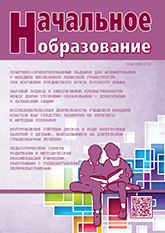The article highlights the problem of the formation of socio-cultural literacy in a junior schoolchild, which is considered as the planned result of his education in primary school. The characteristic of the concept of “socio-cultural literacy” is given, the difficulties of the formation of its individual components are discussed: civic identity; legal and financial culture; tolerance, etc. The examples of methods and techniques aimed at the development of socio-cultural literacy are given, the expediency of using different forms of organization of education is revealed, which contributes to the formation of the ability of primary schoolchildren to constructively build relationships in children’s society and successfully interact.
the concept of “socio-cultural literacy”; junior schoolboy; Russian civil identity; children’s society; methods, techniques and forms of training organization; cooperative activity; the historical role of Russia
1. Federal'nyy gosudarstvennyy obrazovatel'nyy standart nachal'nogo obschego obrazovaniya. - M.: Prosveschenie, 2011. - 32 s.






